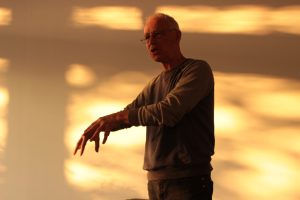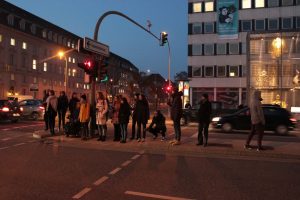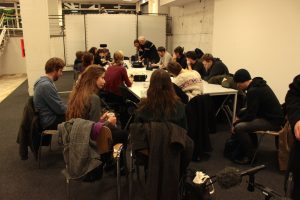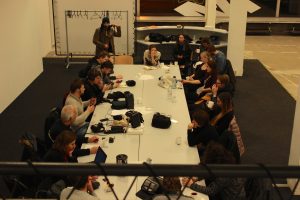
09. November 16
Ort
ZeM – Brandenburgisches Zentrum für Medienwissenschaften
Friedrich-Ebert-Straße 4
14467 Potsdam
Listening to the Environment
As an introduction Peter Cusack will give an overview of his work in field recording and environmental sound, in particular the project ‘Sounds from Dangerous Places’ that asks the question, “What can we learn of damaged places, like the Chernobyl exclusion zone, by listening to their sounds?” The workshop will then visit local soundscapes around ZeM in Potsdam. The aim is to listen to what is there and ask how sound in the environment can be interestingly recorded and mapped. We will make audio field recordings but also explore ways of using writing, drawing, simple images and photographs to document what we hear.
KOORDINATION
Fritz Schlüter, Universität Potsdam, EMW
A workshop in collaboration with the colloquium Sonic Thinking | KlangDenken




(Photographs by Laura Caroline Ranglack (Galaxaura))
Personen
Peter Cusack is a field recordist, musician and sound artist with a long interest in the sound environment. He is based in Berlin and London and is a research fellow in Sound Arts & Design and a member of CriSAP (Creative Research into Sound Arts Practice) at the University of the Arts, London. In 1998 he started the Favourite Sounds Project that explores what people find positive about the soundscapes of the cities – London, Beijing, Chicago, Prague, Manchester and Berlin – where they live. His project Sounds From Dangerous Places (described as sonic journalism) investigates soundscapes at sites of major environmental damage including the Chernobyl exclusion zone, the Caspian Oil Fields, and, currently, the Aral Sea. During 2011/12 he was a DAAD artist-in-residence in Berlin and initiated the Berlin Sonic Places project to consider the relationship between soundscape and urban development .
Mehr Informationen unter
http://sounds-from-dangerous-places.org
http://sonic-places.dock-berlin.de
Fritz Schlüter unterrichtet im Studiengang „Europäische Medienwissenschaft“ im Bereich Sound. Er studierte Europäische Ethnologie an der Humboldt-Universität zu Berlin und war an verschiedenen Forschungs- und Ausstellungsprojekten beteiligt. Aktuelle Arbeitsschwerpunkte sind akustische Feldforschung, Sound Studies, Cultural Studies, Sensory Ethnography, Narrativität akustischer Medien.




